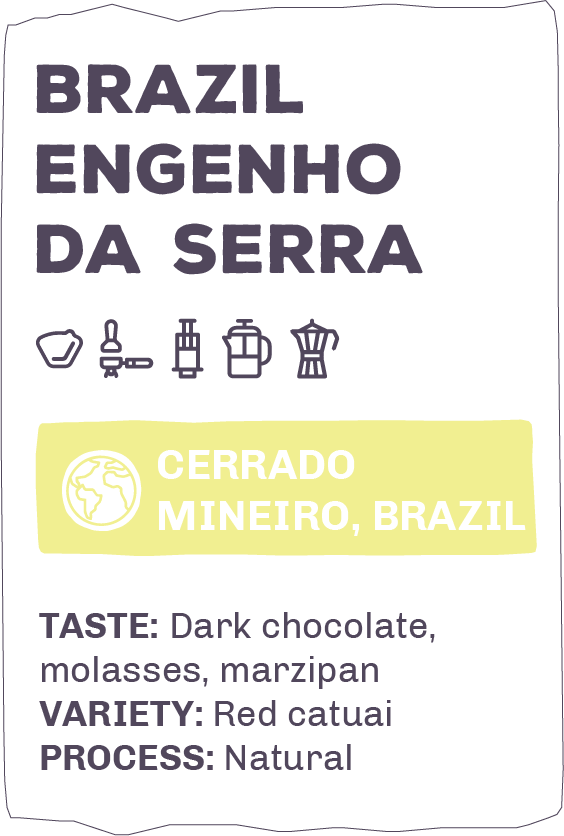The journey of the Engenho da Serra Farm began in the 1970s when its founder, José Humberto de Andrade, one of the pioneers of coffee in the region, acquired his first lands in Carmo do Paranaíba, Minas Gerais.
Today, the farm is managed by the founder’s family, under the careful administration of Sandra Soeli de Andrade along with her nephew Lucas Santos. The focus now is on renewal, never forgetting the tradition and its history.
This lot of Red Catuai coffee underwent Natural processing. Catuai coffees are cultivated widely across Brazil and are known for their high productivity potential. In fact, 90 of the farm’s 135 hectares are planted with Red Catuai, which flowers between September and October for the July and August harvest.
The farm can be found in the Cerrado Mineiro region, which is located northwest of Minas Gerais State which is a world-recognized, high-quality coffee producing origin and became the first Protected Geographical Indication in Brazil in 2005, with full Designation of Origin in 2013. A strong characteristic of this region is its well-defined seasons—a hot, wet summer is followed by a pleasantly dry winter. The dry climate during harvest eliminates potential problems with humidity during the drying process. Today, the area’s 4,500 farmers produce a combined average of 6 million bags per harvest, with an average of 35 bags per hectare.
This particular lot is a natural process that we roast for espresso, but it can be enjoyed using all brewing methods. The coffee has lots of chocolate goodness, with a big body and low acidity. Super smooth, rich and balanced for a perfect morning cup.
The COMICOVEL cooperative—Cooperativa Mixta Cosecha Verde Limitada—in San Juan Intibucá is composed of smallholder producers who farm coffee organically with a focus on overall environmental sustainability.
Members’ properties are located in the Opalaca mountain ranges across the Intibuca and Lempira Departments. The dry mountains of the area reach altitudes of 1500m and are generally planted with pine trees to provide shade for the coffee and increase animal habitat. This variety of Lempira is a washed process which shines at a medium roast. Expect a cup with nice body, balanced sweetness and round acidity. We are tasting notes of cocoa, baking spice and citrus and think it makes a perfect colder weather filter coffee. Try it as an espresso and expect some brightness to shine through!
The name Aquiares means “land between rivers” in the Huetar indigenous language and the farm is situated on the enchanting slopes of the Turrialba volcano, a lush area of forests, rivers, fauna, and bright flora.
Aquiares focuses on carbon neutrality thanks to its founder, Alfonso Robelo, a refugee from neighbouring Nicaragua who fled with his family during the civil war in the 1980s. Today his son, Diego manages the farm which has become an example of innovation and perseverance and serves as a model for sustainable, equitable production for the broader coffee industry. This lot we received from Aquiares is a washed coffee of mixed variety Peaberry, named for its pea-like appearance. Most coffee cherries contain two seeds, and Peaberries occur when only one seed, small and round in shape, develops in the cherry. This is a super sweet and juicy cup of coffee with lots of brightness. Roasted on the lighter side to highlight the notes of plum, honey and lemon. Best enjoyed as a filter coffee.
The Finca El Progreso farm belongs to Rodrigo Sanchez Valencia and Claudia Samboni and grows Gesha, Bourbon, and Caturra trees between 1580 and 1700 meters above sea level.
Centered around the city of Pitalito, Huila’s coffee farms are predominately smallholder owned and over the past ten years have made consorted efforts to produce specialty coffee that reveals the full character of the region’s terroir. Selective manual harvesting, attentive processing, and careful post-harvest sorting all contribute to increasing recognition of the region.
Rodrigo, Claudia, and their team focus on producing both quality and quantity. By following a systematic plan for fertilizations, variety selection, pest and plague control, harvesting, and processing, they and their team are able to produce both consistent quality and overall high volumes per hectare.
The coffee is fermented between 28 and 32 hours, fully washed with clean water, transferred to the solar dryer for several days, and finally moved to shaded raised beds to complete the drying process. Floaters are removed at the first stage prior to de-pulping to produce clean, consistent coffees that represent the terroir of the farm.
This lot of coffee underwent Natural processing at the Deri Kidame washing station. The station is named for the Deri Kidame kebele, or town, where it is located in the Wamena district of Ethiopia’s Guji zone. The area has fertile red brown soil and Cordia Africana and Acacia Ensete ventricosum trees for shade, benefiting the coffee plants grown by the many smallholder farmers who contribute cherries to the washing station.
Coffee cherries are sorted to remove less dense fruit prior to processing. The cherries are then moved to raised beds where they are dried for approximately 18 days.
Guji is a zone in the Oromia Region of southern Ethiopia. More small washing stations are being built in Guji to respond to the demand for improvements in processing to fully capture the range of attributes found in Ethiopian coffee. The Zone’s principal fresh water source is the Ganale Dorya river, which also acts as the boundary line with the neighboring Bale zone to the east.
We’ve roasted this bean so its bright juicy notes of milk chocolate and strawberry shine through regardless of brewing method. We love it as a filter coffee, but with patience and a few minutes would also enjoy it as an espresso any day!














